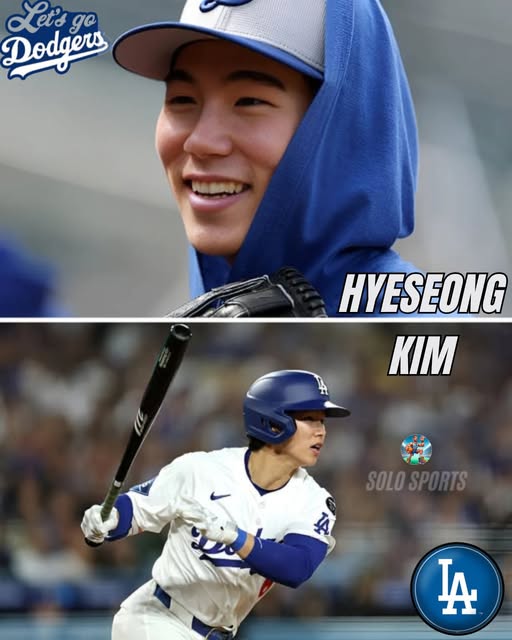The baseball world was buzzing when news broke that South Korean infielder Hyeseong Kim had signed with the Los Angeles Dodgers, turning down offers from other teams, including their cross-town rivals, the Los Angeles Angels. The decision came as a surprise to some, given that both teams presented strong cases for why Kim should join their organization. However, in a recent interview, Kim opened up about the factors that led him to choose the Dodgers, shedding light on his thought process and aspirations for his MLB career.
The Appeal of the Dodgers’ Winning Culture
One of the most significant factors in Kim’s decision was the Dodgers’ established reputation as a perennial contender. Over the past decade, the Dodgers have been one of the most consistent teams in baseball, making the playoffs every year since 2013 and capturing a World Series title in 2020. For Kim, who has experienced championship success in the KBO (Korean Baseball Organization) with the Kiwoom Heroes, joining a team with a winning pedigree was a major draw.
“When you look at the Dodgers, you see an organization that knows how to win,” Kim said. “They have a strong core, great coaching, and a front office that is always looking to improve the team. As a player, you want to be in an environment where winning is the expectation, not just a hope.”
The Angels, while boasting superstar talents like Mike Trout and Shohei Ohtani (before his move to the Dodgers), have struggled to build a consistently competitive roster. Their lack of postseason success in recent years played a role in Kim’s hesitation. “The Angels have great players, no doubt, but I wanted to go somewhere where the entire organization is built for sustained success,” he explained.
Player Development and Coaching Staff
Another critical aspect of Kim’s decision was the Dodgers’ renowned player development system. The organization has a track record of maximizing player potential, whether through mechanical adjustments, advanced analytics, or mental conditioning. For Kim, who is transitioning from the KBO to MLB, the opportunity to work with the Dodgers’ coaching staff was a major selling point.
“The Dodgers are known for helping players grow,” Kim said. “They have a way of breaking down your game and helping you improve in ways you might not have thought of. I’ve heard from other Korean players who have worked with them, and they only had positive things to say.”
The Angels, while making strides in player development in recent years, do not yet have the same reputation. Kim acknowledged that the Angels have talented coaches but felt that the Dodgers’ infrastructure was more proven when it came to helping international players adjust to MLB.
The Role of Fellow Korean Players
The presence of other Korean players on the Dodgers’ roster also influenced Kim’s choice. With players like pitcher Hyun-Jin Ryu having previously thrived in Los Angeles and current stars such as outfielder Jung Hoo Lee (assuming a hypothetical future signing), Kim saw the Dodgers as a team that values and understands Korean talent.
“It’s comforting to know that there are others who have gone through the same transition,” Kim said. “The Dodgers have experience with Korean players, and that makes a difference. They know how to help you adjust both on and off the field.”
The Angels, while having had Korean players in the past, do not currently have as strong of a Korean presence. For Kim, who is moving to a new country, the cultural familiarity was an important consideration.
Long-Term Stability and Contract Terms
While financial details of Kim’s contract were not fully disclosed, it is believed that the Dodgers offered a more structured path to playing time and potential long-term opportunities. The Angels, who have been in a state of flux with their roster construction, may not have been able to guarantee the same level of stability.
“The Dodgers showed a clear plan for how they see me fitting into their team,” Kim said. “They didn’t just say, ‘We’ll figure it out.’ They had a vision, and that was important to me.”
Additionally, the Dodgers’ history of extending and rewarding players who perform well likely played a role in Kim’s confidence in signing with them. The Angels, on the other hand, have had more inconsistent contract management in recent years, which may have given Kim pause.
The Influence of Shohei Ohtani’s Move
Interestingly, Shohei Ohtani’s decision to leave the Angels for the Dodgers may have indirectly impacted Kim’s choice. While Ohtani’s departure weakened the Angels’ roster, it reinforced the Dodgers’ status as the premier destination for elite talent in Los Angeles.
“Seeing a player like Ohtani choose the Dodgers says a lot,” Kim admitted. “When the best players want to be there, it validates your decision. It shows that the organization is doing something right.”
Personal Factors and Lifestyle Considerations
Beyond baseball, Kim also considered the lifestyle differences between playing for the Dodgers versus the Angels. While both teams are based in Southern California, the Dodgers’ stadium, Chavez Ravine, is located in Los Angeles proper, whereas Angel Stadium is in Anaheim. For a player coming from Seoul, the bustling environment of LA may have been more appealing.
“LA is a global city, and there’s a strong Korean community here,” Kim noted. “That makes the transition easier. There are restaurants, cultural events, and people who understand where you’re coming from. That stuff matters when you’re far from home.”
Final Thoughts
Ultimately, Hyeseong Kim’s decision to join the Dodgers over the Angels came down to a combination of competitive ambition, organizational trust, player development, and personal comfort. While the Angels presented a compelling case, the Dodgers’ winning culture, proven track record with international players, and long-term stability made them the ideal choice for the rising infielder.
“This wasn’t an easy decision,” Kim said. “But in the end, I felt that the Dodgers gave me the best chance to succeed in MLB. I’m excited to contribute to this team and help them win another championship.”
As Kim begins his journey with the Dodgers, fans will be watching closely to see how his skills translate to the big leagues. If history is any indication, the Dodgers’ system could help him become the next great Korean star in Major League Baseball.



